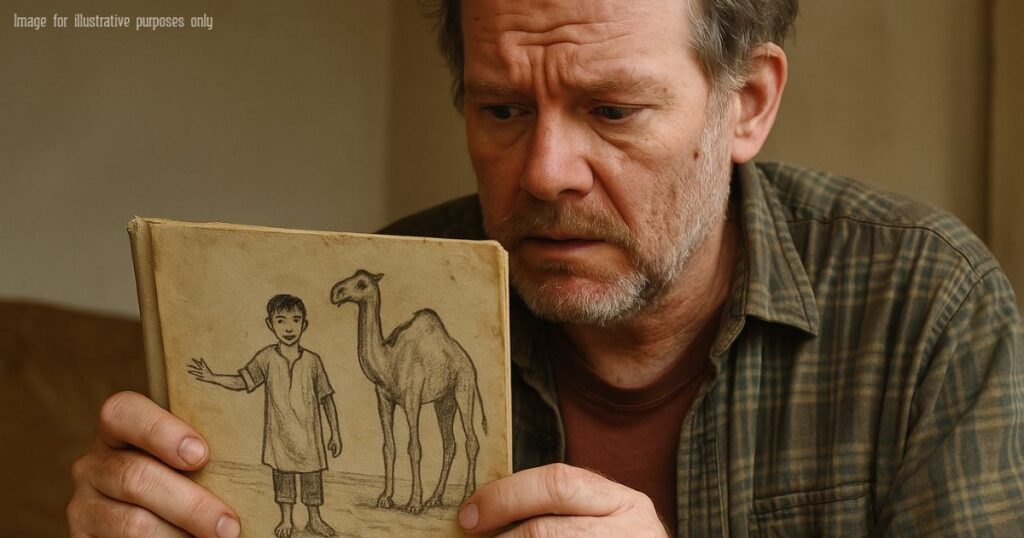Part 4: Dust in the Spine
The Detroit sky bled gray the next morning as Eli boarded a train bound for Chicago. He didn’t have a plan anymore—just a pull. Like the sketchbook was steering him, page by page, toward something he couldn’t name but needed to face.
He sat by the window, sketchbook in his lap, journal open on the fold-down tray. The rhythm of the tracks hummed beneath him, like a heartbeat.
He kept drawing.
Not camels or desert ruins now, but faces.
Jason’s, from the photo in Carla’s box. Strong jaw, eyes too tired for someone so young.
Tariq’s, as best as Eli could imagine—based on sketches, memory, emotion.
And then one more: a man with sharp cheekbones, thick brows, and a crooked nose—drawn from the faint background of a page he hadn’t noticed until now. The figure had been behind a sandbag wall, hands raised, palms out.
Eli stared at it.
Something in that posture—it wasn’t surrender.
It was protection.
He flipped back through Jason’s sketchbook.
It was there again, on page thirty-three. Same man, different angle. A market, smoke in the background. The man’s hand resting on Tariq’s shoulder.
Eli’s pen hovered above the image.
Who was he?
—
Back in Phoenix, Carla answered on the first ring.
“Did your brother ever mention someone local from Basra? Not a translator. Someone who worked nearby. Maybe a civilian with the resistance?”
“Hmm…” Carla trailed off. “There was a letter he got in the late ’90s. Return address in Germany, I think. Written in Arabic. He kept it in a red folder.”
“Do you still have it?”
There was silence, rustling, a drawer opening.
Then: “Found it. There’s a name in English written across the top. It says ‘Haider – Safra District.’ And yeah—it’s from Berlin.”
Berlin.
Eli felt the train lurch beneath him.
—
Two weeks later
The snow was just starting to fall when Eli stepped out of Berlin Hauptbahnhof with nothing but a backpack, Jason’s sketchbook, and a lead scratched onto a decades-old envelope.
It felt surreal. War always felt like something that happened far away. In dusty places. On foreign channels. Not here, in a city rebuilt from the ashes of another war, beneath Christmas lights and the smell of roasted chestnuts.
He found the address after three metro changes and a bus ride.
A small bookshop in the Kreuzberg district. Weathered green sign. Arabic calligraphy carved into the wood.
“Das Gedächtnis des Sandes”
The Memory of the Sand
The bell above the door chimed softly.
Books lined the shelves from floor to ceiling. Some in Arabic. Some in German. A few in English.
Behind the counter stood an older man with striking eyes—one green, one hazel. His hands were stained with ink.
He looked up.
“Eli Morrison,” the man said in perfect English, his accent delicate but distinct. “I wondered when someone would come.”
Eli blinked. “You’re Haider?”
“I am.”
He gestured to a stool beside the stove. “You’ve come far.”
“I’m following a story,” Eli said, setting the sketchbook down. “One that your face might be part of.”
Haider smiled, but it was the sad kind of smile.
“I knew Jason. Not well. But enough to remember the quiet way he looked at suffering. Like he wanted to erase it by drawing it.”
He opened the book slowly, reverently.
“Ah… yes,” he murmured, tracing the air above his own face. “He never asked to draw me. He just did.”
“Do you know what happened to the boy?” Eli asked.
Haider nodded.
“Yes. His name was not Tariq. It was Azzam. His family was killed in a raid by Saddam’s troops in ’89. He wandered for years. When I found him, he was living in the ruins of a burned mosque.”
“Were you protecting him?”
“As best I could,” Haider said softly. “Until the Americans came. Then I thought… perhaps their presence would shield him better than I could.”
“And did it?”
“No,” he said. “But Jason tried. And that mattered.”
Eli let the silence hang.
“Jason blamed himself,” he finally said. “He wrote that he should’ve left the sketchbook with Azzam.”
Haider looked up sharply. “He shouldn’t have.”
Eli frowned. “Why not?”
Haider closed the sketchbook gently. “Because the desert does not need paper to remember.”
—
That night, Haider poured tea and lit a small lamp shaped like a copper dome. The shop grew quiet as snow tapped against the glass.
“I buried the flower,” he said. “The one Azzam made. After the war, I returned to the ruins and found the stone we had marked his grave with. I placed the flower there again.”
“I thought Jason took it.”
“He did. But when I wrote to him later, I asked if I could return it. And he sent it back.”
Eli sat up. “Do you still have it?”
Haider reached into a drawer and returned with a small velvet pouch.
Inside was a rusted bloom—bent metal shaped into petals, its edges soft from time and weather.
Eli held it with both hands. It was heavier than he expected.
“He mailed it to me in ’97,” Haider said. “Along with a note that read: ‘If memory lives where the flower is, let it live in the dirt, not in me.’”
Eli swallowed.
“What should I do with this?” he asked.
Haider looked at him long and slow.
“Draw it,” he said. “So it doesn’t disappear again.”
—
Eli stayed up late that night in a corner of the shop, sketching the flower again and again.
Every bent wire. Every imperfection.
But it wasn’t just the flower anymore.
It was the boy.
It was Jason.
It was Cormac. Basim. Haider. Carla.
It was a thousand faces in the margins of history.
He finished the last page just after dawn.
And for the first time since his father died, Eli cried—not out of grief, but out of gratitude for carrying something that mattered.


